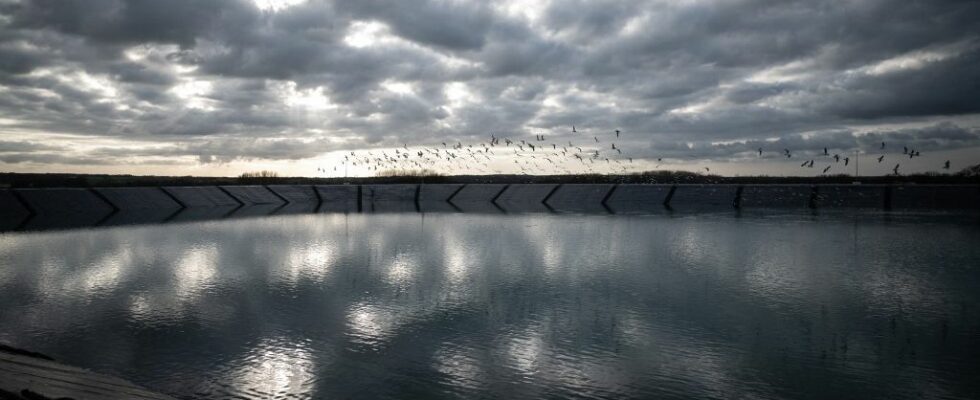With the demonstrations in Sainte-Soline (Deux-Sèvres) against basins, the visibility of these projects to create gigantic water reserves from pumping groundwater has taken on a national dimension. Based on the observation of years increasingly marked by droughts, these water reserves are presented as essential by the authorities to irrigate crops and adapt to global warming. Opponents of these mega basins (the Peasant Confederation, environmental associations and scientists) warn of the risk to millions of cubic meters of this resource for the benefit of large intensive farms, which will be the only ones connected to the basins.
- What are the mega basin projects in France?
At least a hundred basin projects exist in France, including 60 in Poitou-Charentes alone. These artificial reservoirs, the bottom of which is covered with plastic, are supplied by pumping from the surface water tables in winter, when the water reserve is most abundant. A first basin was filled with water last winter in Mauzé-le-Mignon and it was on the construction site of the second, that of Sainte Soline, that demonstrations took place at the end of October.
Some 25 replacement reserves already exist in the south of Vendée (installed between 2007 and 2017) and for the Vienne prefecture, which has just signed a memorandum of understanding for 30 basins, the feedback is very positive. It highlights a “60% reduction in summer withdrawals and a rise in groundwater”. The stated objective is to “secure water supplies and reduce withdrawals in the summer period”.
The basins are connected to existing boreholes in the aquifers for filling in winter. And connections to farms and fields to be irrigated will be installed from the basins.
- What do the opponents of the water reserve projects criticize?
“The first issue is an inequity of treatment between those who will be connected to the basins and those who will not be,” said Nicolas Girod, national spokesperson for the Confédération paysanne. In Deux-Sèvres, if the 16 basins are dug as planned, only 6% of the farmers in the department will be connected to them. “We tell them [aux agriculteurs non raccordés] that they will be quieter to come and pump in summer since the water tables will be spared thanks to the water reserves but it is not at all safe given the state of the water tables, explains Nicolas Girod. One can imagine that the restrictions on withdrawals come even earlier in the season and they would then only concern farmers who are not connected. »
For Christian Amblard, honorary director of research at the CNRS, hydrobiologist, the idea of basins is “simplistic” and deleterious for the resource. “We bring the water to the surface from the groundwater, we expose it to the sun, we increase its temperature which leads to the development of bacteria and cyanobacteria, some of which are toxic: we destroy the quality of the resource”, alert-t -he. He also warns against the considerable loss of volumes linked to evaporation. “A study carried out on the great North American lakes shows that they lose, depending on exposure and sunshine, between 20 and 60% of their water resources by evaporation, which is quite considerable. He also points to a perverse effect of this water available in quantity for irrigation which can lead to unreasonable use. The authorities highlight on this point “a management tool to adjust irrigation to soil moisture, weather conditions and crop needs”.
The hydrobiologist Christian Amblard is also worried about a drying out of the basements, which should result in reducing or even drying up the flows of the springs which were outcropping thanks to these underground reserves.
- What do they offer on their side?
The detractors of these projects begin by explaining that the lack of water is an effect of runoff which prevents the infiltration of the resource into the soil. In particular because of compaction by agricultural machinery weighing several tons, they are no longer able to absorb water and it is on this problem that they should work as a priority according to them.
“This basin model does not lead to a change in the agricultural model, it just leads to allowing the continuation of the one whose ravages we know (disappearance of peasants, expansion of farms, etc.), summarizes Nicolas Girod. We give them the means to continue with this model”. The Confederation paysanne believes that we must work to promote infiltration into the groundwater by developing organic farming and agroforestry.
The union asked to meet Prime Minister Elisabeth Borne in charge of ecological planning, on this subject. Former prefect of Poitou, she knows this explosive case of basins well.

